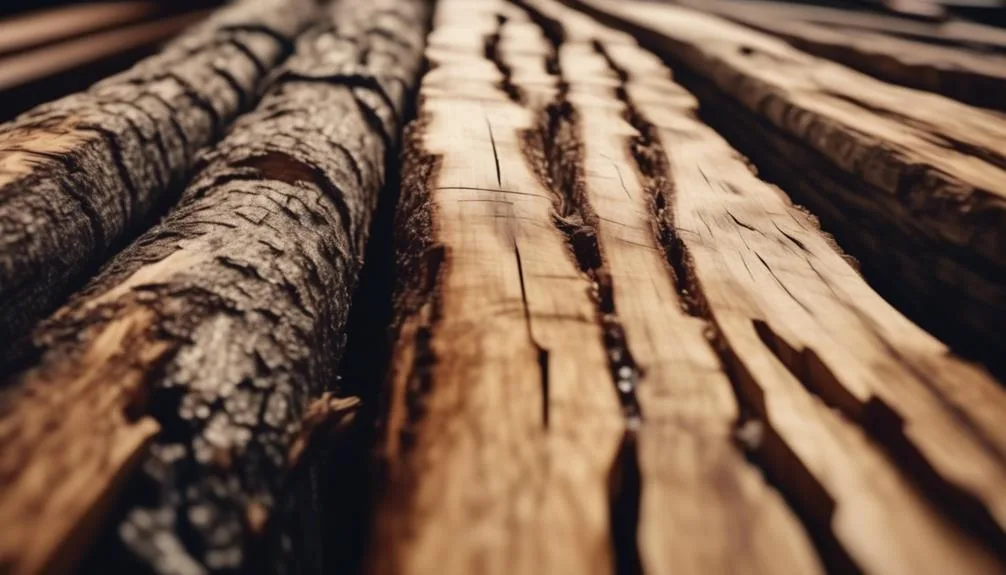Hickory wood is renowned for its strength and resistance. It is commonly used in drumsticks, tool handles, furniture, and sports equipment. But can it handle the demands of building? Let's examine hickory wood's qualities and uses to see if it measures up.
Hickory Tree Wood Characteristics
Hickory tree wood, known for its exceptional strength and flexibility, is highly valued for its use in various applications due to its unique characteristics. The wood density and strength of hickory make it a popular choice for tool handles, furniture, and flooring.
Its natural variations in color palette, ranging from pale white to rich, dark brown, add to its aesthetic appeal. The heartwood, in particular, exhibits a reddish-brown hue, while the sapwood is a creamy, pale color. These variations allow for diverse design options, making hickory wood a versatile choice for interior decor and construction.
Whether you're drawn to its durability, strength, or its beautiful natural variations, hickory wood stands out as a sturdy and attractive option for a wide range of projects.
Durability of Hickory Wood
Renowned for its exceptional strength and flexibility, hickory wood's durability sets it apart as a top choice for various applications, including tool handles, furniture, and flooring.
Hickory is highly durable due to its dense grain structure and natural resistance to wear and tear. This durability makes it particularly well-suited for high-traffic areas and heavy-duty use. Its remarkable strength allows it to withstand significant pressure and impact, making it an ideal material for construction and woodworking projects.
Hickory's resistance to moisture also contributes to its durability, as it's less prone to warping or rotting compared to other types of wood. When properly maintained, hickory wood can last for many years, making it a reliable and long-lasting option for a wide range of uses.
Applications in Construction
With its exceptional durability and strength, hickory wood is a highly sought-after material for a wide range of construction applications, including framing, flooring, and heavy-duty structural elements.
In terms of environmental impact and sustainability, hickory is a favorable choice due to its regenerative properties and the fact that it's a renewable resource. Its growth rate and natural abundance contribute to its sustainability.
Additionally, hickory wood is known for its cost-effectiveness and availability, making it an attractive option for construction projects. Its widespread availability helps in reducing transportation costs and energy consumption.
The durability and strength of hickory wood make it a long-lasting construction material, reducing the need for frequent replacements and minimizing waste.
Maintenance and Longevity
When considering the maintenance and longevity of hickory wood, it's important to implement regular inspections and protective measures to ensure its continued durability and strength in construction applications.
Long term care for hickory wood involves keeping an eye out for signs of wear, such as cracks, decay, or insect damage. Regularly inspecting hickory wood for these issues allows for prompt maintenance, which is crucial in preserving its structural integrity.
Utilizing preservation techniques such as sealing or staining can significantly extend the longevity of hickory wood by protecting it from moisture, sunlight, and pests.
Additionally, ensuring proper ventilation and avoiding prolonged exposure to extreme weather conditions can further contribute to its durability.
Considerations for Use in Construction
To ensure optimal performance in construction projects, consider hickory wood's exceptional durability and strength, making it an excellent choice for structural components and heavy-duty applications.
When considering hickory for construction, its environmental impact and sustainability should be taken into account. Hickory is a sustainable option as it's a fast-growing hardwood, allowing for responsible harvesting practices. Its natural resistance to rot and insect infestation also contributes to its longevity, reducing the need for frequent replacements and minimizing environmental impact.
Additionally, hickory's cost-effectiveness and availability make it an attractive choice for various construction projects. It's widely available in many regions and offers a balance between durability and affordability.
Taking into consideration these factors, hickory wood stands as a strong contender for construction applications.
Conclusion
In summary, hickory tree wood offers durability and reliability for construction projects. Its strength and resistance to shock make it suitable for a range of uses, from flooring to furniture.
With proper care, hickory wood can endure for many years, providing a sustainable and cost-effective option. When considering your next construction project, hickory wood's longevity and resilience make it a compelling choice.

My interest in trees started when I first saw the giant sequoias in Yosemite.
I was a teenager then, and I remember thinking, “I need to learn more about this.”
That moment stuck with me.
A few years later, I went on to study forestry at Michigan Tech.
Since graduating, I’ve worked in a mix of hands-on tree care and community education.
I’ve spent over ten years helping people understand how to plant, maintain, and protect the trees in their neighborhoods.
I don’t see trees as just part of the landscape.
They are living things that make a real difference in our daily lives.
